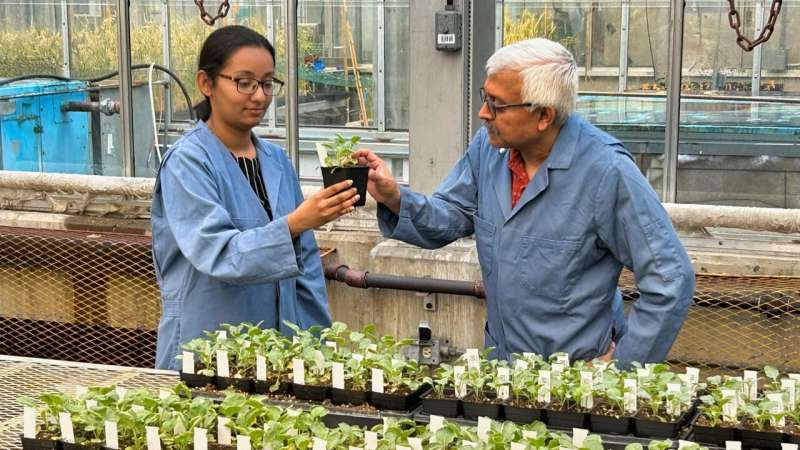This article has been reviewed according to Science X's editorial process and policies. Editors have highlighted the following attributes while ensuring the content's credibility:
fact-checked
trusted source
proofread
Study shows that adding silicon to soil could help protect canola from clubroot

Adding silicon to soil could help battle clubroot, a deadly disease in canola crops, new University of Alberta research shows.
The study, the first known to explore the effects of silicon on the disease specifically in canola, showed that mixing the element with soil reduced overall clubroot symptoms in susceptible plants—those not bred for resistance to the disease—by up to 46%. The work is published in the journal Physiologia Plantarum.
The greenhouse experiments revealed that infection was slowed and the formation of galls on the plants was reduced, when silicon, in the form of a water-soluble salt, was included in the soil.
As a result, the treatment also appeared to improve the height, root length and drought tolerance of the plants, even in the presence of the clubroot pathogen, the study found.
Potential boon for producers
The findings could ultimately give canola producers another way to manage clubroot, says study lead Ananya Sarkar, a Ph.D. candidate in plant science in the Faculty of Agricultural, Life & Environmental Sciences.
"The experiment shows the potential benefits of silicon as an effective, economical tool for canola producers," says Sarkar, whose work was supervised by professor Nat Kav.
Research has already shown that silicon—one of the most common elements on Earth—eases disease-related stress and also improves resistance to pathogens in various other plants, Sarkar notes.
Silicon, currently an ingredient in some fertilizers, also has the advantage of being less costly to apply to canola crops than other alternatives such as liming, she adds.
Staying ahead of an evolving adversary
By analyzing silicon's interaction with the canola plants, Sarkar and her co-researchers also found possible routes for improving clubroot resistance.
The research identified several canola plant genes and metabolites that were altered by silicon application.
These underlying mechanisms could identify specific genes associated with clubroot disease resistance and potentially help combat constantly evolving resistance breakdown, she notes.
"Considering that on the prairies, genetic resistance has been the first line of defense in clubroot-infested fields, this finding could contribute to a robust management strategy for canola producers."
The fact that silicon not only protects against diseases like clubroot, but also has the ability to improve plant responses to environmental stresses like drought and extreme heat, makes the discovery even more significant, Kav adds.
"In this era of climate change, any method we have at our disposal to improve plant health would contribute to enhancing global food security."
The team will now take their research beyond the greenhouse and into the field, to explore whether silicon benefits canola against several mixed types of clubroot.
More information: Ananya Sarkar et al, Silicon ameliorates clubroot responses in canola (Brassica napus): A "multi‐omics"‐based investigation into possible mechanisms, Physiologia Plantarum (2023). DOI: 10.1111/ppl.13900
Provided by University of Alberta





















